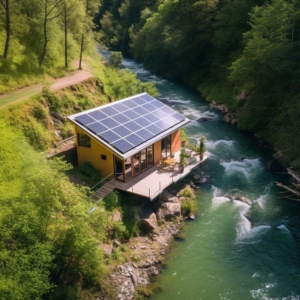Real estate is a secure investment that can increase in value over time. Owners can earn regular income by renting out their properties through inspired property management. In many places, real estate has performed better than other investments like savings, bonds, or stocks. There are two main types of real estate investments: real properties (like houses or apartments) and financial properties (like REITs or funds). Each type is affected by different factors. For real properties, rental income and location are important. For financial properties, value and interest rates are key factors.
Inspired Property Management for Modern Landlords
 Are you a landlord looking for innovative ways to manage your properties? Managing rental properties can be challenging, but with the right strategies, you can turn it into a smooth and rewarding experience. In this guide, we’ll explore five inspired property management strategies that will help modern landlords like you optimize operations, increase tenant satisfaction, and boost profitability.
Are you a landlord looking for innovative ways to manage your properties? Managing rental properties can be challenging, but with the right strategies, you can turn it into a smooth and rewarding experience. In this guide, we’ll explore five inspired property management strategies that will help modern landlords like you optimize operations, increase tenant satisfaction, and boost profitability.
1. Understanding Your Role as a Modern Landlord
As a modern landlord, your role goes beyond just collecting rent. You’re responsible for creating a positive living experience for your tenants while protecting your investment. This involves understanding and complying with local laws and regulations, maintaining the property in good condition, addressing tenant concerns promptly, and fostering a respectful and communicative relationship with your tenants. Additionally, staying updated on industry trends and best practices will help you adapt to the changing needs of tenants and remain competitive in the market. Also, It’s crucial to understand the diverse aspects of property management and adopt a proactive approach to address challenges effectively.
2. Leveraging Technology for Efficient Management
 Leveraging technology in property management revolutionizes how landlords operate, offering numerous benefits for both efficiency and tenant satisfaction. Here’s how it plays a crucial role:
Leveraging technology in property management revolutionizes how landlords operate, offering numerous benefits for both efficiency and tenant satisfaction. Here’s how it plays a crucial role:
-
Streamlining Operations: Property management software automates tasks like rent collection, lease tracking, maintenance requests, and financial reporting. This eliminates manual paperwork, reduces errors, and saves valuable time.
-
Enhanced Communication: Online portals and mobile apps enable seamless communication between landlords, tenants, and vendors. Tenants can easily submit requests, access documents, and make payments, while landlords can quickly respond to inquiries and track maintenance progress.
-
Data-Driven Decision Making: Technology provides insights into property performance, tenant behavior, and market trends. This data can be used to make informed decisions about rent adjustments, marketing strategies, and property improvements.
-
Remote Management: Cloud-based solutions allow landlords to manage properties from anywhere, providing flexibility and convenience. They can monitor security systems, track occupancy rates, and address issues promptly, even when not physically present.
- Marketing and Advertising: Utilizing online platforms and virtual tours helps landlords reach a wider audience and showcase properties effectively, attracting potential tenants more efficiently.
3. Sustainability and Green Practices
 Adopting sustainable practices can attract eco-conscious tenants and reduce utility costs. Consider energy-efficient appliances, water-saving fixtures, and recycling programs. Highlighting these features in your listings can also make your properties more appealing. Sustainability and green practices play a vital role in modern property management, offering numerous benefits for both landlords and tenants:
Adopting sustainable practices can attract eco-conscious tenants and reduce utility costs. Consider energy-efficient appliances, water-saving fixtures, and recycling programs. Highlighting these features in your listings can also make your properties more appealing. Sustainability and green practices play a vital role in modern property management, offering numerous benefits for both landlords and tenants:
-
Environmental Responsibility: Green practices, such as recycling programs, waste reduction initiatives, and the use of eco-friendly cleaning products, minimize the environmental impact of the property. This appeals to environmentally conscious tenants and aligns with corporate social responsibility goals.
-
Tenant Attraction and Retention: Sustainable features like green certifications, energy-efficient appliances, and healthy indoor environments are increasingly sought after by tenants. Offering these features can attract and retain high-quality tenants, leading to lower vacancy rates and increased rental income.
-
Enhanced Property Value: Investing in sustainable upgrades can increase the market value of the property, making it a more attractive investment for potential buyers. Green buildings often command higher sale prices and have greater appeal to environmentally conscious investors.
4. Financial Management and Planning
Effective financial management is key to a successful rental business. Keep detailed records of income and expenses, set aside funds for unexpected repairs, and regularly review your financial plan to ensure profitability. Consider hiring a professional accountant if needed.
Financial management and planning are essential for successful property management, ensuring profitability and long-term sustainability. It involves:
-
Budgeting: Creating a comprehensive budget that outlines income and expenses, including rent collection, property maintenance, taxes, insurance, and marketing costs. This helps track cash flow and identify potential financial risks.
-
Rent Collection and Management: Establishing efficient rent collection procedures, managing late payments, and handling security deposits. This ensures a steady income stream and minimizes financial losses due to non-payment.
-
Expense Tracking: Monitoring and controlling expenses related to property maintenance, repairs, utilities, and other operational costs. This helps identify areas for cost reduction and optimize resource allocation.
-
Tax Planning: Developing tax strategies to minimize tax liabilities and maximize deductions. This requires staying updated on relevant tax laws and regulations to ensure compliance and optimize financial outcomes.
- Risk Management: Identifying and mitigating potential financial risks associated with property management, such as property damage, liability claims, and vacancy rates. This involves implementing insurance coverage, conducting regular property inspections, and maintaining adequate reserves for unexpected expenses.
5. Proactive Property Maintenance

Proactive property maintenance is a crucial aspect of property management, focusing on preventing issues before they escalate into costly repairs or tenant dissatisfaction. It involves:
-
Regular Inspections: Conduct routine inspections of the property to identify and address minor problems like leaks, cracks, or wear and tear before they become major issues.
-
Preventative Maintenance: Scheduling regular maintenance tasks like HVAC servicing, plumbing checks, electrical inspections, and pest control to keep systems running smoothly and prevent breakdowns.
-
Timely Repairs: Addressing repair requests promptly to avoid further damage and inconvenience to tenants. This demonstrates responsiveness and commitment to maintaining a safe and habitable environment.
-
Seasonal Maintenance: Preparing the property for different seasons by cleaning gutters, checking insulation, servicing heating and cooling systems, and performing other necessary tasks to ensure comfort and safety throughout the year.
Managing rental properties can be challenging, but with the right strategies and inspired property management, you can turn it into a rewarding venture.
ALSO READ: Top 7 Areas with Affordable Houses to Rent in Ballymena





Join The Discussion